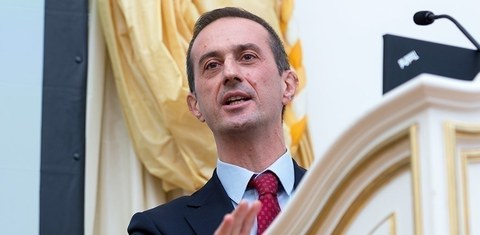Nov 18, 2021
Bundesbank Lecture with Lucio Sarno (University of Cambridge)
Registration:
The talk will take place in Festsaal of the Faculty of Business and Economics,
Hülße-Bau, 3rd floor, northern wing on Helmholtzstr. 10, 01069 Dresden. Seating capacity in the Festsaal is limited due to applicable Corona regulations. Please also note that 2-status will be checked upon admission. Participation in the Bundesbank Lecture is only possible with valid 2G proof and after prior registration.
Please register for the Bundesbank Lecture by December, 01, 2021:
Abstract:
For decades academic research has found that exchange rate fluctuations are virtually unpredictable, raising a number of puzzles in international macro-finance. Yet, a significant fraction of the finance industry allocates capital to currency investments and has generated high returns over time. Over the last ten years academic research has made much progress and largely rationalized the nature of predictability in currency markets, providing important insights on what drives currency movements and on which investment strategies add value to the marginal investor. These include canonical strategies such as carry, momentum and value, as well as more sophisticated strategies that use less conventional predictive variables or proprietary information. This lecture will provide an overview of this literature, and then connect the returns from these strategies to simple asset pricing models to describe reasonable stochastic discount factors that can price the cross-section of currency returns.
About Lucio Sarno:
Lucio Sarno is Professor of Finance and Head of the Finance Group at Cambridge Judge Business School and JM Keynes Fellow in Financial Economics at the University of Cambridge. Lucio’s main research interests are in international finance, empirical asset pricing, and asset management. In particular, he has written extensively on various aspects of currency markets. He is the author of over 90 articles, published in top finance journals such as the Journal of Finance, the Journal of Financial Economics and the Review of Financial Studies, as well as general and top field journals in economics and management science. His work is often featured or quoted in the press, including the Financial Times, the Wall Street Journal, and the New York Times.

